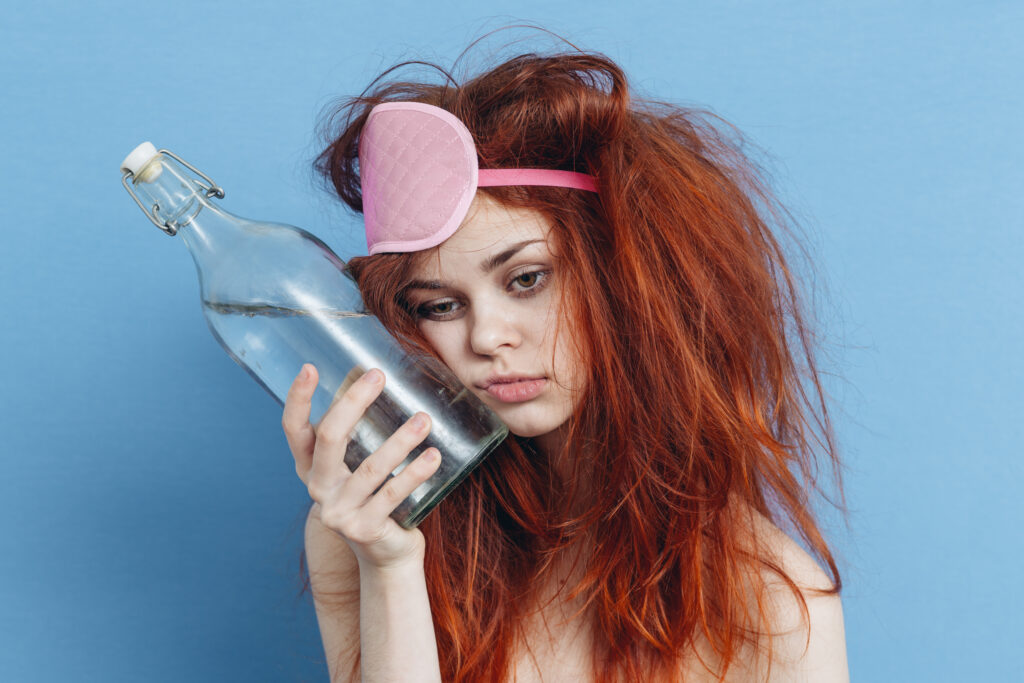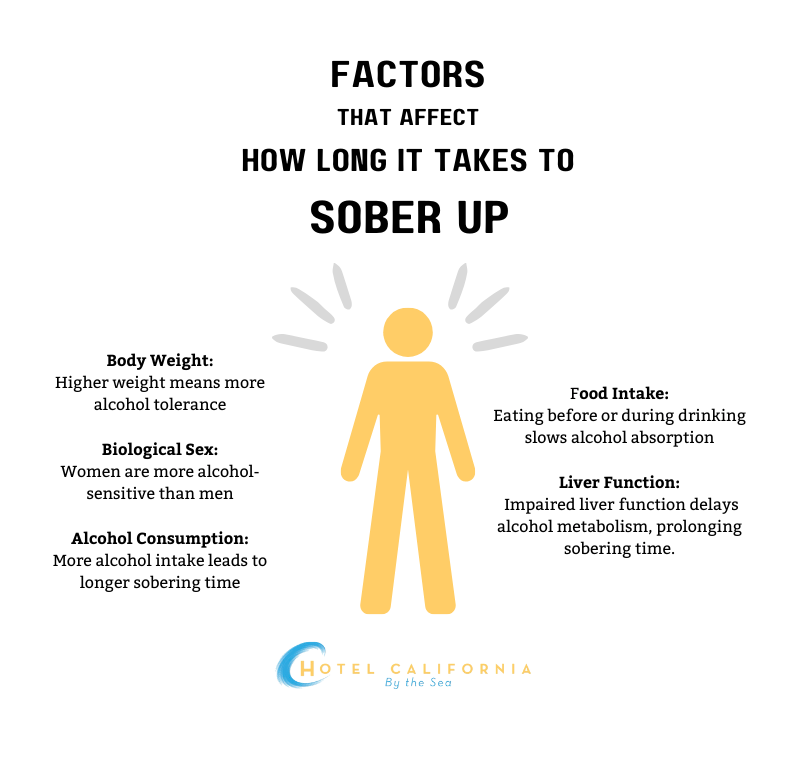How long does it take to Sober Up?
Is there a way to “sober up” quickly? There are many myths and misconceptions about how to “sober up” after consuming excess amounts of alcohol. Some believe drinking more water helps to flush out the alcohol from the body. Others believe a strong cup of coffee can help jump-start your system. Despite the many different “tips and tricks” for sobering up, the rate at which alcohol is metabolized and eliminated from the body remains the same no matter what a person does. But, the more you drink, the longer the alcohol will stand in your body. There is no scientifically proven or clinically led way to speed up the elimination of alcohol from the system.

So what does it mean to “sober up?” Sobering up usually refers to the time it takes a person to no longer feel the symptoms of intoxication. A person can begin to feel sober and no longer impaired by alcohol. Feeling sober can mean a person will feel more alert, clear-minded, and have less brain fog usually caused by alcohol intoxication. However, despite the sober feelings, there are still traces of alcohol within the body.
What about detoxing? Are detoxing and sobering up the same? Detoxing is a medical term used to describe the process by which a person’s body fully eliminates toxins and drugs from the body. It is a physical process using various methods including medication-assisted treatments. A person going through detox will often experience withdrawal symptoms as mind-altering toxins leave the body.
How does alcohol metabolism work?
- Absorption. Alcohol is rapidly absorbed into the bloodstream from the stomach and small intestine.
- Transportation to Liver. The bloodstream then carries the alcohol to the liver where it is processed and metabolized.
- Enzyme breakdown. There are two different enzymes responsible for breaking down the alcohol in the liver. In the liver, an enzyme called alcohol dehydrogenase (ADH) works to break down ethanol in the body. It then works to further convert the alcohol with acetaldehyde dehydrogenase (ALDH), into acetic acid.
- Elimination. Eventually, the acetic acid is broken down further into carbon dioxide and water, which is then eliminated through urine.
On average, a person can process about one unit of alcohol per hour. One unit of alcohol represents one standard drink. What is one standard drink?
- 1 Beer – 12 oz
- 1 glass of White Wine – 5 oz
- 1 glass of Red Wine – 4 oz
- 1 shot of 80-proof alcohol – 1.5 oz

Factors that can contribute to the rate of metabolization of alcohol
- Concurrent medications – If a person is drinking and taking other substances that require processing in the liver, it can make the metabolization of alcohol much slower. If the liver has to process more than one substance at a time, it can overwhelm the organ and create a toxic build-up of the drug leading to the effects of alcohol to last longer. Medications such as Tylenol are examples of a medication that is processed in the liver and can affect how fast alcohol is processed and eliminated.
- Overall health – If a person is sick and dehydrated or has liver issues, it can take much longer for the body to properly metabolize alcohol.
- Food – If there is food in the stomach, it can block alcohol from absorbing into the stomach lining. It slows down the process of absorption into the bloodstream.
- Gender – In general, women have more body fat than men. Because of this, they can become more intoxicated more quickly and stay intoxicated much longer than men.
- Genetics – There are many types of genes that can affect how quickly or efficiently metabolize alcohol in the body.
How is Alcohol content measured?
We hear a lot about the blood alcohol content level (BAC). What is BAC? Blood alcohol content level measures the amount of alcohol in the bloodstream. On average, about 20% of alcohol is absorbed into the bloodstream through the stomach, while the other 80% passes through the small intestine where it then gets absorbed into the bloodstream more quickly. When there are excess amounts of alcohol in the bloodstream, it can slow down the metabolism of alcohol because the liver is not able to work fast enough to process the substance. This leads to alcohol continuing to circulate into the bloodstream making the user feel intoxicated.
- BAC of .01 – .03 – Users are usually unable to feel any effects of alcohol
- BAC of .07 – .09 – The user begins to feel mild impairment of balance, speech and vision
- BAC of .08 – The legal limit by which a person is considered to be intoxicated and unable to operate a moving vehicle
- BAC of .13 – .20 – The user no longer has motor control and major loss of balance including blurred vision
- BAC of .25 – .30 – The user will experience severe intoxication that can lead to mental confusion, nausea and vomiting
Check Your Insurance Coverage for FREE
Find out if your insurance covers addiction treatment in minutes. We accept most insurance!
How long does it take to sober up?
So how long does it actually take to sober up from alcohol? Unfortunately, time is the only thing that allows the body to “sober up.” Metabolization of alcohol will remain the same no matter what you try to do to speed up the process. There are some factors that can impact the metabolization process. Some of these include whether or not you are binge drinking or excessively drinking, the number of drinks consumed, how quickly you drank, how often you drink, and body weight. These factors can slow down the process even more. It’s impossible to try and instantly get rid of alcohol from the body, but there are many ways to help you feel better more quickly.
- Cold Showers – Taking a cold shower can help kickstart your nervous system to wake up your body and increase alertness. It can help you look less intoxicated, but it does not clinically sober you up.
- Drinking Coffee – Caffeine does not help lower the blood alcohol content in your body. It is a stimulant and can help counteract the effects of alcohol. But be careful as it is a dehydrating substance. Alcohol is also a dehydrating substance. Mixing both alcohol and caffeine can lead to dehydrating effects on the body.
- Drinking Water – Alcohol is dehydrating and drinking water can help make you feel better. However, it does not help speed up the metabolism of alcohol.
- Exercise – Exercising helps release natural endorphins and feel-good chemicals that boost energy levels and combat stress and anxiety. This can help you feel more sober, awake and mentally clear.
- Food – Eating food helps replenish nutrients and vitamins needed to combat toxins and break down alcohol.
- Vomiting – Throwing up can help relieve symptoms of nausea. Unfortunately, it also exposes you to stomach acids that can be damaging to the esophagus and the tooth enamel.
- Sleep – Getting more sleep can help the body feel more rested and revitalized after drinking. However, this does not mean the body has fully processed and eliminated alcohol from the body.
Reach out to Hotel California by the Sea
We specialize in treating addiction and other co-occurring disorders, such as PTSD. Our Admissions specialists are available to walk you through the best options for treating your addiction.
Treatment of Alcohol Use Disorder
Alcohol is a central nervous system depressant. It produces initial feelings of energy, which then turn into lethargy, depletes the body of fluids and causes cognitive impairments. Excessive alcohol use can lead to alcohol use disorder which is defined by experiencing blackouts and unexplained injuries, neglecting personal and professional responsibilities and an increase in tolerance to alcohol followed by experiencing withdrawal symptoms. Alcohol use disorder can be a difficult disease to treat. With the help of Hotel California by the Sea, our dedicated team of professionals will provide clients with the tools and resources to overcome their addiction.
We provide all levels of care including detox, residential and outpatient programs. We also provide clinically proven treatments including CBT, DBT and group therapy to all clients who may have co-occurring mental health disorders. Alcohol addiction is a mental illness that can be successfully treated. Although recovery and sobriety is a lifelong process, Hotel California by the Sea provides clients with the care and support they need to achieve and maintain their sobriety goals.
References:
https://www.medicalnewstoday.com/articles/321103
https://alcorehab.org/hangover/sober-up/
https://www.addictiongroup.org/blog/sober-up/
https://alcoholrehabhelp.org/treatment/sobering-up/
https://www.healthline.com/health/how-to-sober-up
https://www.goodrx.com/well-being/substance-use/how-to-sober-up-fast
https://zinniahealth.com/substance-use/alcohol/sleep-for-hangovers
https://www.abc.ca.gov/education/licensee-education/alcohol-facts/
https://www.bicyclehealth.com/blog/how-long-does-sobering-up-take-really
